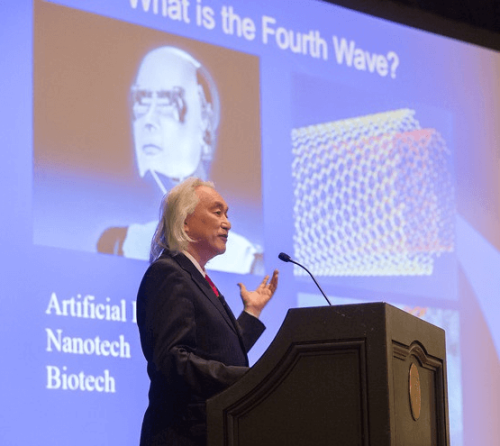Dr. Michio Kaku, a professor of physics at the City University of New York and author of Physics of the Future, boldly set out how he feels the next 50 to 100 years will develop, based on the interviews he did with 300 scientists for his book. It is a future, he said, in which the internet will be replaced with what he called the “brain net,” an always-on and always available set of technologies that in his view would vastly improve life.

The work that will lead to this potential future, he said, will come from science and technology, which has historically been the source of wealth. Physicists, he pointed out, devised the transistor, the laser, radio and TV, and the MRI, and helped develop the space program and the internet.
But that progress is not continuous; instead it comes in waves. So far, he said, there have been three great waves of wealth creation:
- Steam power, which led to the railroads and other advances and helped create the working class, but which created a bubble whose excesses spurred a backlash that led to the development of Marxism;
- Electricity, which created the modern working class but also another bubble, which resulted in the rise of industrial unions; and
- High technology, which helped spur globalization but created yet another bubble and led to a global rise of populism and nationalism.
The fourth wave will involve artificial intelligence, nanotechnology, and biotechnology. In a future in which chips cost a penny—less than scrap paper now—the internet and its successor will be ubiquitous. As a result of these advances he foresaw developments such as smart contact lenses, which would tell people who they were meeting with and, if necessary, translate what they said. It would allow mass customization of products—including body parts perfect for each individual. Even wallpaper will become interactive, changing colors at a whim, or being used as a screen for sessions with “robo-advisers,” such as a doctor in the middle of the night for urgent care.
These technologies will also lead to what he called “perfect capitalism,” in which uncertainty about supply and demand, about pricing and the quality of goods, will be eliminated. Imagine walking into any store and knowing immediately the best price for a product, and having a complete report on its quality. “The future will be frictionless, seamless, personalized, and digitalized,” he said.
And finally, he foresaw significant advances in medical technology as it, like other industries, becomes digitalized. The technology already exists to perform “liquid biopsies” to detect cancer and other diseases at a far earlier stage than before. He predicted a future in which the human brain will be mapped, just as the human genome was. With that advance, he said, doctors will be able to use “brain pacemakers” in Alzheimer’s patients to recreate memories for them when they forget things. Even dreams, he said, will be able to be recorded.
“The future will be frictionless, seamless, personalized, and digitalized.”

